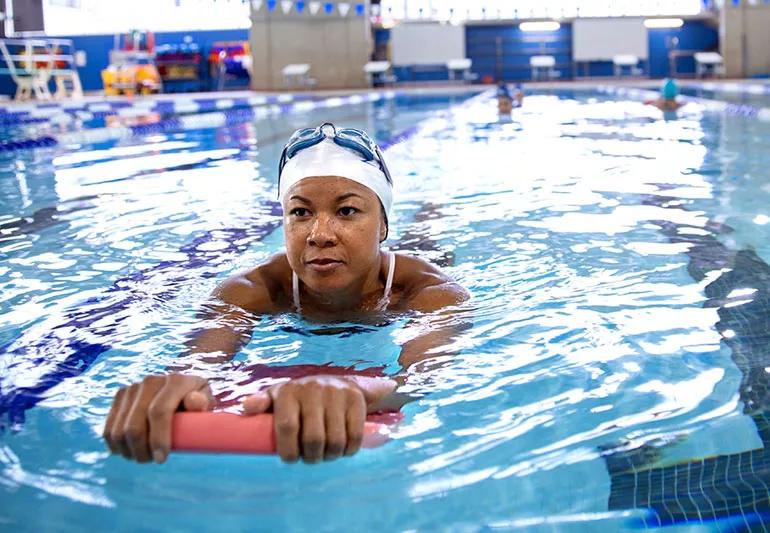Germ-killing chemicals in the water can lead to respiratory issues

Chlorine has been dubbed the perfume of swimmers. Its bleach-like odor is unescapable at an indoor pool, after all. The smell of the germ-killing chemical clings to everyone splashing around in the water.
Advertisement
Cleveland Clinic is a non-profit academic medical center. Advertising on our site helps support our mission. We do not endorse non-Cleveland Clinic products or services. Policy
But all that chlorine isn’t just leaving its scent on swimmers. In some cases, it also irritates airways after creeping into throats and lungs.
“Chlorine cough” serves as a soundtrack on many pool decks. So, what exactly is the condition and should swimmers be worried about it? Let’s dive into the topic with pulmonologist Rachel Taliercio, DO.
Chlorine is the most common disinfectant used in indoor and outdoor swimming pools. Trace amounts — we’re talking 1 to 3 parts per million — are added to pool water to kill any dangerous bacteria.
Problems start when chlorine binds to sweat, urine and other body waste floating around in pool water. (Bad news alert: There’s an alarming amount of pee in pools.)
Chlorine and this icky stuff combine to make chloramines, which can irritate your nose, throat and lungs. Chloramine-polluted air is heavier, too, leading it to settle at a height where you’re more apt to breathe it in.
In outdoor pools, these chlorine-related vapors dissipate quickly in the surrounding air and aren’t much of an issue.
But add chlorine to an indoor pool and fumes may linger in the contained space.
“If an indoor pool isn’t regulating its air well, swimmers can begin to see symptoms of tracheobronchitis, or chlorine cough,” says Dr. Taliercio. “You could experience coughing or wheezing. There might be some burning in your throat, too.”
Advertisement
Competitive swimmers are at greater risk for chlorine cough than recreational swimmers, as they spend more time in pools than the average person. People with asthma also may be more likely to experience chlorine cough.
Exposure to higher levels of chlorine in the air around indoor pools can increase your risk of breathing issues. The gases may cause the bronchial tubes in your lungs to spasm, a reaction called airway hyperresponsiveness.
Symptoms could include:
These issues may last for just a few hours or linger for days. If you train in an indoor pool and experience these symptoms regularly, talk to a healthcare provider.
The lungs of infants and toddlers aren’t fully mature. Given that, there’s a suggested (but not conclusive) association between new-onset asthma and swimming in an indoor pool at an early age.
But the relationship isn’t clear cut, emphasizes Dr. Taliercio, and some studies cast doubt on this cause-and-effect theory.
“I wouldn’t advise parents who hear about this chance of developing asthma to stop putting their kids in recreational swimming programs,” she continues. “There’s too much overall health benefits kids get from swimming.”
Let’s start with the obvious: If you’re swimming in an indoor pool and suddenly feel like you’re not breathing well, it’s time to get out of the water.
“In many cases, simply getting out of the pool and leaving will offer relief,” notes Dr. Taliercio. Getting in the shower right away to rinse off any chlorine and chloramines from your body also may help.
If problems persist, talk to a healthcare provider about options to reduce inflammation in your airways. You may also want to consider swimming at a different pool that uses a different water disinfectant (such as bromine) or offers better ventilation.
Advertisement

Sign up for our Health Essentials emails for expert guidance on nutrition, fitness, sleep, skin care and more.
Learn more about our editorial process.
Advertisement

Allergies, postnasal drip, asthma or reflux could be to blame for a cough that won’t quit

Honey can help relieve a cough by lowering inflammation in your airways and loosening up mucus

Dry coughs mean irritation, while wet coughs mean mucus

Germs spread quickly and easily, so covering your face, washing your hands and avoiding close contact are key

A chronic cough is one that lasts for eight weeks or more — and means you should see a healthcare provider

Over-the-counter options range from syrups to pills, lozenges to menthol rubs — but medication isn’t always the best treatment

Honey, humidity and the right OTC meds can help bring on cough relief

Kids under 4 shouldn’t use cough and cold medicine — older kids may or may not benefit

Even small moments of time outdoors can help reduce stress, boost mood and restore a sense of calm

A correct prescription helps your eyes see clearly — but as natural changes occur, you may need stronger or different eyeglasses

Both are medical emergencies, but they are very distinct events with different causes